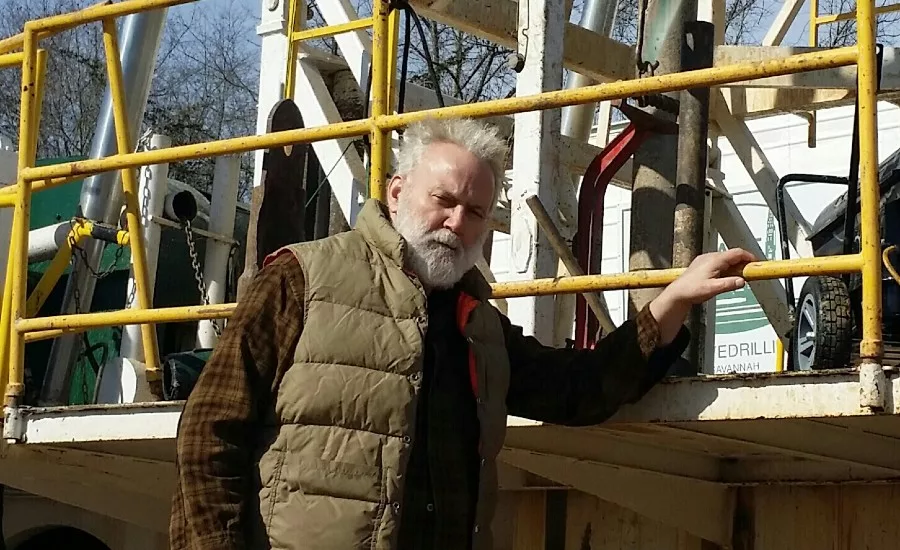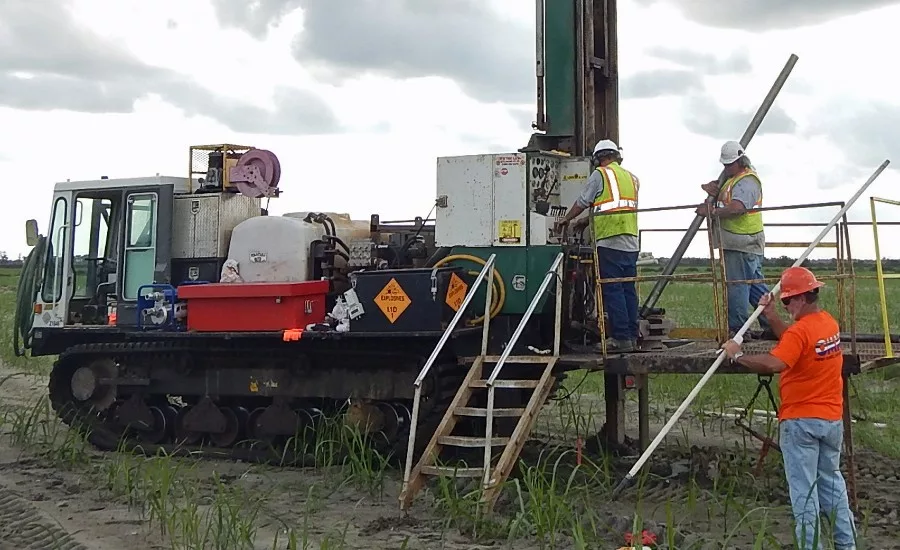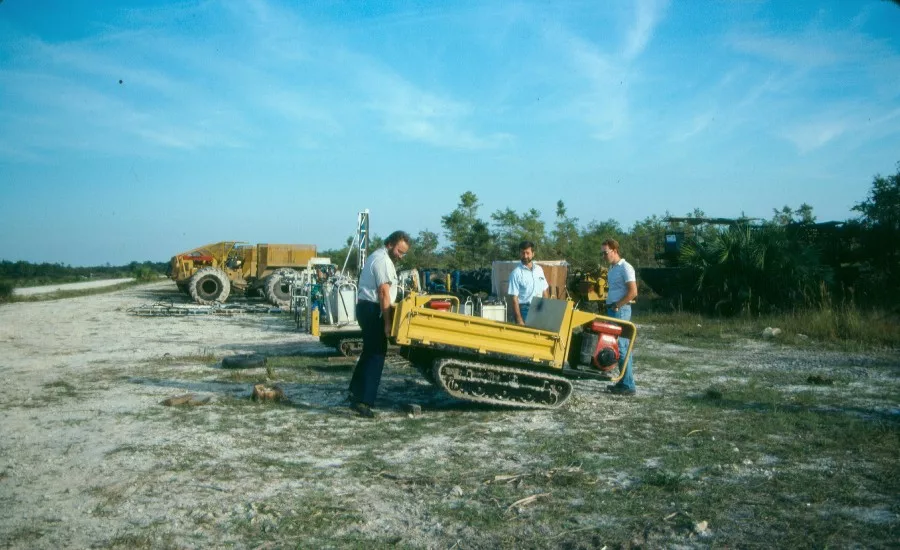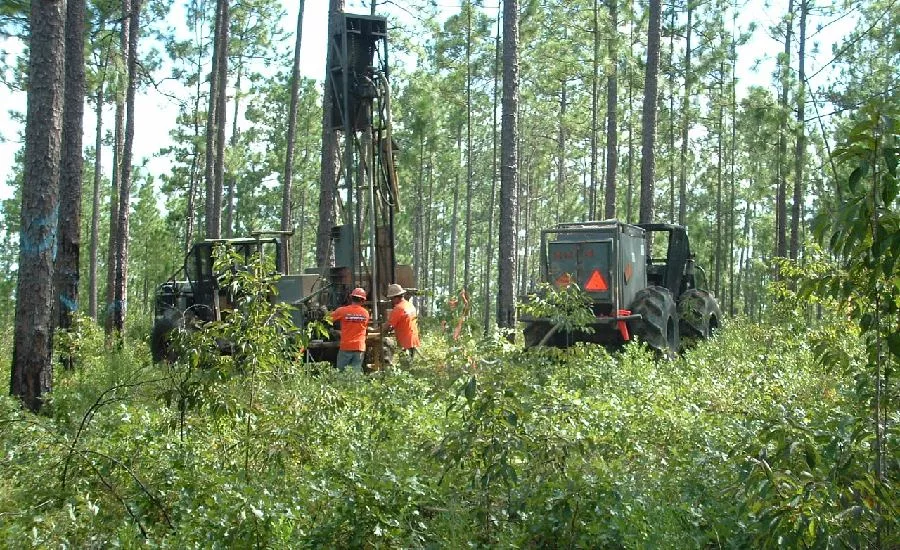How Can Drillers, Geologists Work Better Together?
Geologist, Drilling Vet Bridges Gaps between Science, Drillers

Dr. Thomas Herbert recommends scientists, consultants and other non-drillers get “walking around skills,” that is, some grasp of the practical skills drillers use on the job every day.
Source: Thomas Herbert

Herbert carries geologist licensing in several states, but he also relishes field experience.
Source: Bruce Lindsey

Herbert, left, works a portable drill with Ben Hewitt of Shell in this 1987 photo.
Source: Thomas Herbert photos

We aim to offer readers perspectives from every part of the industry. That, of course, includes scientists.
Dr. Thomas Herbert holds professional geologist licenses in Alabama, Alaska, Florida, Georgia, Mississippi and New York. He is past chair of the Florida Professional Geology Board and serves as a member of several environmental policy groups. He was even recognized in 2018 with the AIPG public service award from the American Institute of Professional Geologists (AIPG).
He also worked extensively as a driller, chewing through the same earth he studies and advises clients on as a geologist and consultant. That combination gives him a rock-solid foundation for explaining geology to drillers.
Our conversation here is edited for space and clarity.
Q. From your standpoint, what does a successful working relationship between drillers and geologists look like? How can they work better together?
A. From the driller standpoint, you walk in and you’ve got a degree. You’re the college kid. You don’t have the same skill set that they do. From the academic side, you get a kid that comes out that’s got a degree and they think they know a lot, and they really don’t know anything. It’s a blank slate and they have to learn.
I was lucky enough because I had two guys who were World War II veterans that were 20, 25 years older than I was. … They taught me the skills of the trade. I sign their timesheets, but they gave me the best skill I had, which was what they called “walking around skills,” — just learning how to do things. Can you tear apart a motor? Can you splice lines? Can you weld? Those are all things that are very important, not necessarily in your academics toolkit, but they’re important when you start a job and you start that geology-driller relationship and it just grows. You know, you spend four years riding in a truck with the guys, you know them, you trust them on the location. You have a briefing before you start and you get on the same page you tell them what you think the geology is, and then you take the lessons as they pull the levers and feel the differences in the rig vibration and the penetration rate, and all that. They’ll tell you what you’re in. You know, it’s a real symbiotic relationship. You’ve got to maintain it. It takes personal skills.
You’ll get you’ll go out there and get tested and hazed if, you know, you’re the college kid who comes out. I passed it and flying colors because the guy said, “Hey, can you move that truck?” It was a big stake-rack truck, tandem, you know big and heavy thing. … I got in and drove it and he said, “Well, how’d you learn how to do that?” I said, “Well, you didn’t know, but I got a CDL.”
It’s people skills. You’ve got to get in and get comfortable each other, and you know that the other guy is doing his job, you’re doing your job. You’re not walking over the top of them. That’s basically it.
Q. You were once a driller in Michigan, but now work based in Florida. Give the audience a snapshot of the drilling conditions you’ve seen in these two very different states.
A. Well, I had five years traveling the Mitten, including what they called “upper peculiar,” which is the Upper Peninsula. We toted that rig all over the place. We were doing a lot of soil testing and then moving quickly into early stages of environmental monitoring, because the state highway departments put a lot of salt on the roads and it was doing some damage to neighboring water wells. The issue is, up there, there are a lot of shallow wells — anywhere from 15 to 100 feet. Most of them are in glacial materials, which can be glacial tills with big boulders in them and a lot of clay. Then you got areas that are glacial stream channels and out wash or sand and gravel out in front, which are incredible aquifers. They just they produce a huge amount of water.
Drilling up there was tough. I learned how to thaw a drilling rig out in Gaylord, Michigan, when it was 10 degrees out, and the rig had frozen up. We had put burn barrels around the rig to heat up so we could get drilled.
You know, moving to Florida, geology is different. It’s different from north to south. You get in the Panhandle, you get a lot of deep sands. You’ve got deep freshwater aquifers in sand and gravel. You go from Tallahassee south, you’re more in a limestone. You’re in what’s called the Floridan Aquifer System, which is a little bit of clay and sand the top, and then you’re into alternating limestones, dolomites. Then, superimposed on that, you have karst conditions, which is cave development. Then you’ve had a lot of fracturing of that rock. So when you look at the aquifer characteristics, you’re drilling through pretty dense limestone or dolomite, then you’ll get into fracture systems and cave systems. It’s quite different.
The Floridan Aquifer System was named 55 years ago. It was originally called the Floridan Aquifer. It’s really a system because there’s a whole shopping list of different aquifer and formation names that go into it. Now, it’s pretty much the upper, middle and lower. The upper is where most of the freshwater is coming from right now.
Q. Are their ideas out there that might work when it comes to smart water allocation and groundwater regulation, but people think maybe, “Oh, we’re not going to try that. It’s too hard.” What ideas might not get stakeholder buy-in, but you think will work?
A. I think it’s incumbent on geologists and hydrogeologists to really educate. I’ve been active in the American Institute of Professional Geologists, the Florida geology group, and I’m active with the Florida Ground Water Association (FGWA). What we have to do is take every opportunity to explain water to people who don’t understand. Many people think that groundwater is a river running under the ground. Well, in some cases in Florida, it is. But it’s a very, very special case.… It’s just understanding how water occurs, how it moves, how we remove it, how we protect it.
We’ve had a lot of people complaining about drilling through the Upper Floridan zone, you know for oil wells or disposal wells. I have to explain to them, “Well, there’s three casing strings and about a foot of cement that’s protecting you, so it’s not it’s not something that’s an open hole that you’re going to commingle things going up and down the borehole.
There are a lot of things from an engineering-technical standpoint, but the important thing is communication with the people who are out there in meetings. I’ve given countless talks to various groups. The key thing — and we’ve got meetings this week with the Florida Legislature with the Ground Water Association — is that the decision-makers need to understand from whence we have come with all this water use, and all these things that we’ve built around handling water and regulating water.
How do we go forward from here? It’s key that folks like myself and others interact with the legislative groups, to let them know [what our stances are]. … They have the dollars. They allocate the dollars. … When you’re when you’re in water management, you’re building things. You’re drilling things. You’re piping. You’re treating. You’re doing all these things that are part of management, but it takes dollars. It takes front-end money to get into that. Then you then you can set up a tax system to carry it forward in time. All of that stuff has to be conceptualized, understood and, at some juncture, when somebody comes in and they don’t understand it, and they’re in a key role politically, they can just throw a wrench in it. You know, “Hey, why are we doing this? Let’s do something else.” Well guys, we’ve been doing this for 50, 60 years, and this is why we got to do it.
The Full Interview
We interviewed Dr. Thomas Herbert of Lampl-Herbert for episode 17 of our Drilling In-Site series. See the full conversation at www.thedriller.com/insite, or listen to the podcast version at www.thedriller.com/insite-podcast. Episodes also in Apple’s Podcast store. Search Drilling In-Site and tap Subscribe.
Working on an interesting project or have industry wisdom to share? Email verduscoj@bnpmedia.com to be considered for a guest spot on Drilling In-Site.
Looking for a reprint of this article?
From high-res PDFs to custom plaques, order your copy today!


